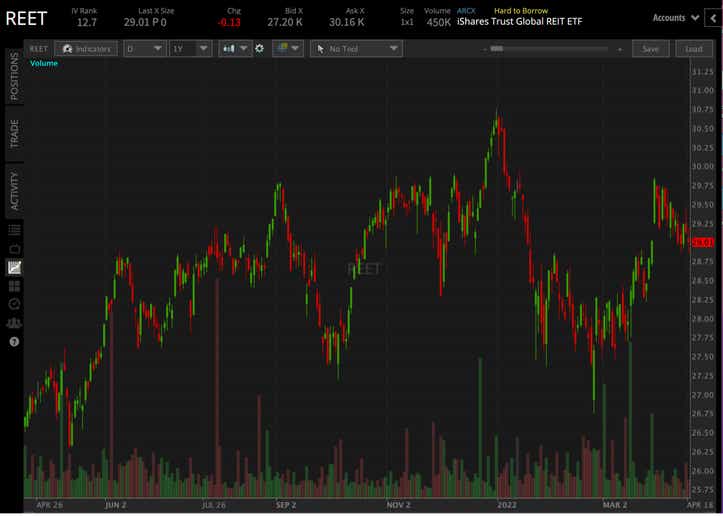Are These The 10 Best REIT Stocks & ETFs to Watch in 2022?

Are These The 10 Best REIT Stocks & ETFs to Watch in 2022?
REAL ESTATE INVESTMENT TRUSTS (REITs): WHAT YOU NEED TO KNOW
Real estate investment trusts are companies with a business model of generating income through ownership, operating or financing of income-generating properties. REITs extend to more than just residential properties such as student housing, apartments, condominiums and townhomes; they also invest in commercial, industrial and raw land properties.
Traders and investors can get exposure to REITs through a range of company stocks such as Equity Residential, and exchange traded funds (ETFs) like Vanguard Real Estate Index Fund ETF. Finding the best REIT stock or ETF for you will be subject to your risk tolerance, market volatility and portfolio diversification, among other factors.
TOP 5 REIT STOCKS TO WATCH
- Equity Residential (EQR)
- Regency Centers (REG)
- American Tower (AMT)
- Affiliated Managers Group (AMG)
- Sun Communities (SUI)
You can trade REIT stocks and ETFs listed on this page, as well as others on the award-winning tastytrade platform.1 To get started, create an account. The underlying assets featured on this page aren’t definitively the best REITs. Instead, they were selected based on several factors, including investor interest, volatility and valuation.
.png?format=pjpg&auto=webp&quality=50&width=677&disable=upscale)
![]()
Equity Residential (EQR)
Equity Residential is a real estate investment trust that’s listed on the New York Stock Exchange (NYSE) under the ticker symbol EQR. The company was founded in 1969 by Sam Zell and Bob Lurie. The scope of Equity Residential’s operations comprise of buying, managing, developing and selling properties.
With over 300 properties which equal just under 80,000 apartment units in several states, it’s not surprising that the company’s market cap surpassed $33 billion (as of March 2022). At the time of writing, Equity Residential’s 52-week implied volatility (IV) rank was around 35%, with 52-week highs in the $90 range and lows in the $70 range.
![]()
Regency Centers (REG)
Regency Centers was established by Martin and Joan Stein in 1963. The real estate investment trust operates shopping centers in suburban areas, with over 90% of them being anchored by grocers that rank in the top three spots of their market.
Over 390 properties fall under the company’s portfolio, which it manages or either owns fully or jointly. Regency Centers’ market cap was at $11.6 billion in early March 2022, with its IV rank sitting high at 81%. The company announced that shareholders would be receiving a quarterly cash dividend of 62.5 cents per share in April 2022.
![]()
American Tower (AMT)
American Tower is a real estate investment trust that provides wireless and broadcast communications infrastructure in 25 countries across six continents. Formed in 1995 by Steven Dodge, this NYSE-listed company has been in business for 30 years with more than 6,000 employees.
With a presence of over 220,000 sites globally, the company was valued at over $108 billion as of early March 2022. The potential for large swings in American Towers’ share price was reflected in its IV rank, which rose above 101% during the same period.
tastytrade account holders can type any stock symbol + “.IVR” on the desktop platform to see changes in implied volatility and implied volatility.
.png?format=pjpg&auto=webp&quality=50&width=667&disable=upscale)
![]()
Affiliated Managers Group (AMG)
Affiliated Managers Group is an internationally operating asset management company. It has assets under management worth more than $800 billion. Founded in 1993 by William J. Nutt, this NYSE-listed company has become a leader in partnerships with several investment boutiques. Its affiliate partners include ValueAct Capital, Artemis Investment Management and Pantheon.
Getting close to rounding up its third decade in business, Affiliated Managers Group’s valuation was around $5 billion in the early days of March 2022, with an IV rank of 93%.
![]()
Sun Communities (SUI)
Sun Communities is a REIT that specializes and invests in housing communities, recreational vehicle resorts and marinas – being either an owner, operator, interested third party or a combination of all three.
Since Milton M. Shiffman founded the company in 1975, it has grown to be the operator of almost 160,000 developed sites. At the end of 2021, the company added an excess of 45,000 wet slips and dry storage spaces to its portfolio.
Sun Communities is a member of the world’s 1,000 most valuable companies club. Along with other key factors, its portfolio and operations have seen its valuation crossing the $20 billion threshold for the first time in 2021. This was at the $21 billion mark at the beginning of March 2022.
TOP 5 REIT ETFs TO WATCH
- Vanguard Real Estate Index Fund ETF (VNQ)
- iShares U.S. Real Estate ETF (IYR)
- Invesco KBW Premium Yield Equity REIT ETF (KBWY)
- iShares Global REIT ETF (REET)
- SPDR Dow Jones REIT ETF (RWR)
.png?format=pjpg&auto=webp&quality=50&width=669&disable=upscale)
![]()
Vanguard Real Estate Index Fund (VNQ)
The Vanguard Real Estate Index Fund ETF was launched in 1996. It seeks to track the collective performance of real estate company stocks that form part of the MSCI U.S. Investable Market Real Estate 25/50 Index. REITs are just some of the companies in the index, with others still classified as belonging within the real estate sector.
With a March 2022 market cap of about $30.6 billion, the Vanguard Real Estate Index Fund ETF signals strong investor interest. Dividends are paid out on a quarterly basis – at the end of Q1 2022, investors received a cash amount of $0.577 per share.
Traders looking for information on recent dividends can utilize the tastytrade platform quote details feature, as shown below.
.png?format=pjpg&auto=webp&quality=50&width=699&disable=upscale)
![]()
iShares U.S. Real Estate (IYR)
Formed at the end of the 20th century, iShares U.S. Real Estate ETF came into being with its investment objective of looking to track a U.S. real estate equity index. Its benchmark is the Dow Jones U.S. Real Estate Capped Index.
The index mostly consists of REITs – specialized, residential, office and others. Over the last year, IYR shares have traded as high as $116.89 and as low as $95.01. In December 2021, IYR investors got a dividend of $1.137 per share for the quarter.
![]()
Invesco KBW Premium Yield Equity REIT ETF (KBWY)
The Invesco KBW Premium Yield Equity REIT ETF was launched in 2010. Contrary to the traditional tracking of a market-cap-weighted index, this fund focuses on competitive dividend yields. As a result, the basket of stocks in the benchmark index are mostly small to mid-cap REITs.
This is also reflected in KBWY’s market cap, which was around of $109 million in early March 2022, with middling IV around the same time. The benchmark index for this ETF is the KBW Nasdaq Premium Yield Equity Index, which is reconstructed each quarter.
![]()
iShares Global REIT ETF (REET)
The iShares Global REIT ETF aims to track the performance of international real estate companies in both the emerging and developing markets. Formed in 2014, it follows the results of the FTSE EPRA Nareit Global REITS Net Total Return Index.
The index consists of companies with operations of real estate properties like warehouses, office space, and apartments.
Over the past 52 weeks, REET has traded in the mid 20s to low 30s range.

![]()
SPDR Dow Jones REIT ETF (RWR)
The SPDR Dow Jones REIT ETF is listed on the NYSEArca. It was launched at the dawn of the 21st century. Now, having been around for over two decades, it’s amassed a market cap of over $2.8 billion.
The fund tracks the Dow Jones U.S. Select REIT Index, which consists of companies that are listed in the United States, according to the performance of its total returns. The SPDR Dow Jones REIT ETF’s IV rank was high at around 88% at the beginning of March 2022.
HOW TO TRADE AND INVEST IN REITs
You can start trading and investing in REIT stocks and ETFs with these steps:
- Learn about REITs and how to buy and trade them
- Create a tastytrade account or log in
- Create a trading plan and a risk management strategy
- Choose a REIT stock or ETF and open your position
- Monitor and close your position
You pay zero commission on an unlimited number of shares when trading stocks outright, including REITs, with tastytrade.2 Alternatively (and depending on liquidity), traders can utilize options on equities, which lets you manage your trades more flexibly allowing more control over risk, capital and breakeven prices.3 One options contract will give you exposure to 100 shares of a stock, rather than a single share.
Learn more about options trading
Options trading also differs from investing (holding company shares) in several ways. Below are some of the main differences between the two.
Options on stock trading | Investing (owning) physical shares of a stock |
Going long or short on the share price of a stock through buying and selling of call and put contracts | Taking ownership of a stock’s shares, thus becoming a shareholder |
Ability to link your trade or market assumption to a specific duration | Shares can be held in perpetuity as there’s no expiration date |
Profit can be made from upward, downward and neutral price moves, and possible profits and losses depend on the strategy being employe | Profits can only be realized by selling higher than the original buy price, and through receiving dividends (if the company pays them) |
Ability to manage and manipulate risk through the use of strategies, plus it can be defined upfront | The maximum amount at risk is capped at the full investment value (excluding additional fees) |
BEST REITs SUMMED UP
- Real estate investment trusts (REITs) stocks and ETFs give you exposure to the property market
- A REIT is a company that’s in the business of generating income from properties it owns, operates or both
- Properties owned and managed by REITS can vary in type, e.g. residential, commercial, raw land or industrial
- Finding the ideal REIT opportunities for you depends on several factors, including risk tolerance, volatility, and portfolio diversification
- REIT ETFs as well as other ETFs can be weighted in different ways, such as market cap, dividend yield and net total return, which is based on the basket of stocks being tracked
1 Named the Best Online Broker by Investor’s Business Daily (IBD) in its ninth annual survey.
2 All stock and ETF trades incur a clearing fee of $0.0008 per share, and applicable exchange and regulatory fees.
3 Options aren’t commission-free. Pay $1.00 per contract to open, which is capped at a maximum of $10.00 per leg. Applicable exchange, clearing, and regulatory fees still apply to all opening and closing trades.
tastytrade, Inc. and tastylive, Inc. are separate but affiliated companies.
Options involve risk and are not suitable for all investors. Please read Characteristics and Risks of Standardized Options before deciding to invest in options.